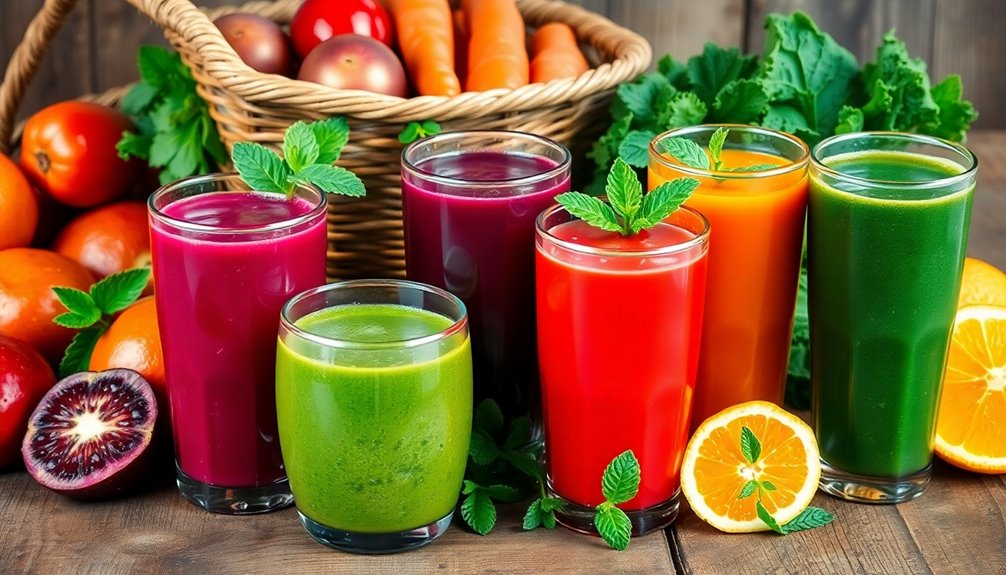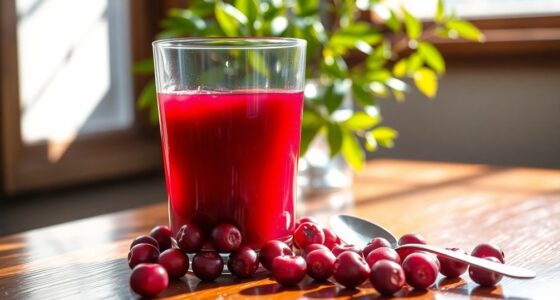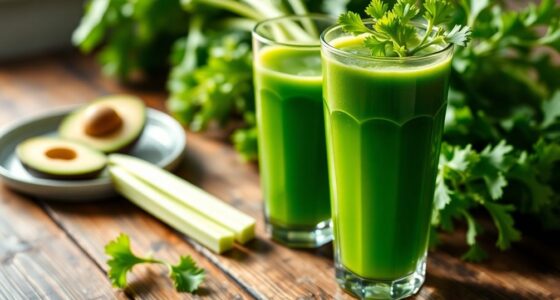Juicing can supercharge your health by providing essential nutrients and antioxidants in every glass. Fresh juice options like orange and beet support your immune system and heart health, while green juices reduce inflammation. You'll find that cranberry juice helps lower UTI risks, and adding kale boosts your nutrient intake. Plus, homemade juice recipes allow you to customize your health benefits. Stick around to discover an exciting variety of juice drinks that can enhance your wellness journey!
Key Takeaways
- Citrus Juices: Rich in vitamin C, options like orange and lemon juice boost immune support and enhance overall health.
- Vegetable Juices: Juices from kale, spinach, and celery reduce inflammation and support heart health through diverse nutrients.
- Beetroot Juice: Enhances athletic performance and boosts energy levels by improving blood flow and providing essential nitrates.
- Berry Juices: Juices like pomegranate and cranberry are high in antioxidants, promoting heart health and lowering infection risks.
- Tropical Juices: Juices such as coconut water provide natural hydration and essential electrolytes for replenishing fluids.
Benefits of Juicing for Health
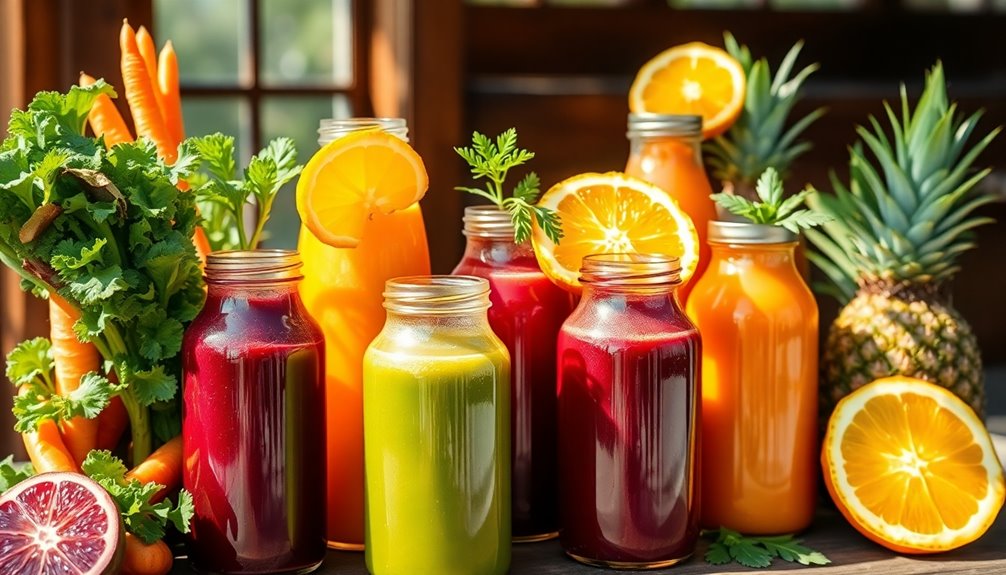
When you incorporate juicing into your routine, you're not just enjoying delicious flavors; you're also reaping numerous health benefits. Fresh juice, packed with vitamin C, can considerably boost the immune system, especially with options like orange and lemon.
Healthy juice recipes featuring kale and spinach help reduce inflammation and lower chronic disease risks. Juices made from beets and apples are excellent for heart health, thanks to their antioxidants and high nitrate content.
By juicing, you can easily consume whole fruits and veggies, allowing you to meet daily recommended servings. This practice can flush out toxins and may help prevent cellular aging and certain cancers. Additionally, unique homemade fruit juice recipes can provide tailored health benefits that suit your individual needs.
Embrace the benefits, and your body will thank you!
Nutritional Profiles of Popular Juices
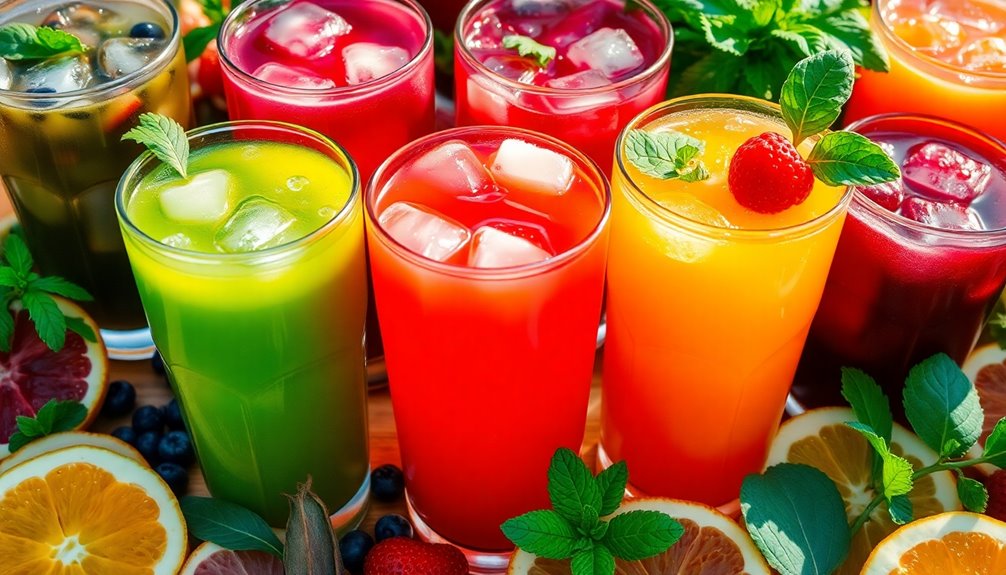
Juicing offers a wide variety of flavors and health benefits, but understanding the nutritional profiles of popular juices can help you make informed choices. For those looking to serve juices conveniently, why choose a plastic juice dispenser? These dispensers are lightweight, durable, and often designed with easy-pour spouts, making them ideal for parties and gatherings while reducing the risk of spills. Additionally, plastic dispensers are generally more cost-effective than glass options, making them a practical choice for both personal and commercial use.
For instance, cranberry juice is rich in antioxidants and high in vitamin C, helping to boost your immune system while lowering the risk of urinary tract infections.
Tomato juice, an excellent source of lycopene, nearly doubles your daily vitamin C needs and promotes heart health, lowering the risk of heart disease.
Beet juice enhances athletic performance with its betalains and nitrates.
Pomegranate juice supports heart health with anthocyanins and vitamin K.
Finally, apple juice, especially cloudy varieties, is a great source of potassium and antioxidants.
These healthy juice recipes can supercharge your health!
Delicious Juice Recipes to Try

Exploring new juice recipes can be a fun way to boost your health and tantalize your taste buds.
Try the Immune-Boosting Juice, blending beet, carrots, celery, broccoli, and garlic for a vitamin C-packed drink that enhances immune function.
For hydration, sip on an invigorating young green coconut juice that delivers essential electrolytes.
If you're looking for antioxidants, whip up an Anti-Aging Juice with blueberries, strawberries, kale, and beet to combat visible aging.
For a delicious juice that supports weight loss, mix vitamin C-rich oranges, carrots, and apples.
Finally, indulge in an Aphrodisiac Juice made with coconut water, celery, banana, and figs to enhance your mood and hormone production.
Each of these juice recipes offers unique health benefits! Additionally, incorporating high antioxidant foods like berries in your juices can further enhance their health-boosting properties.
Tips for Making Healthy Juice at Home
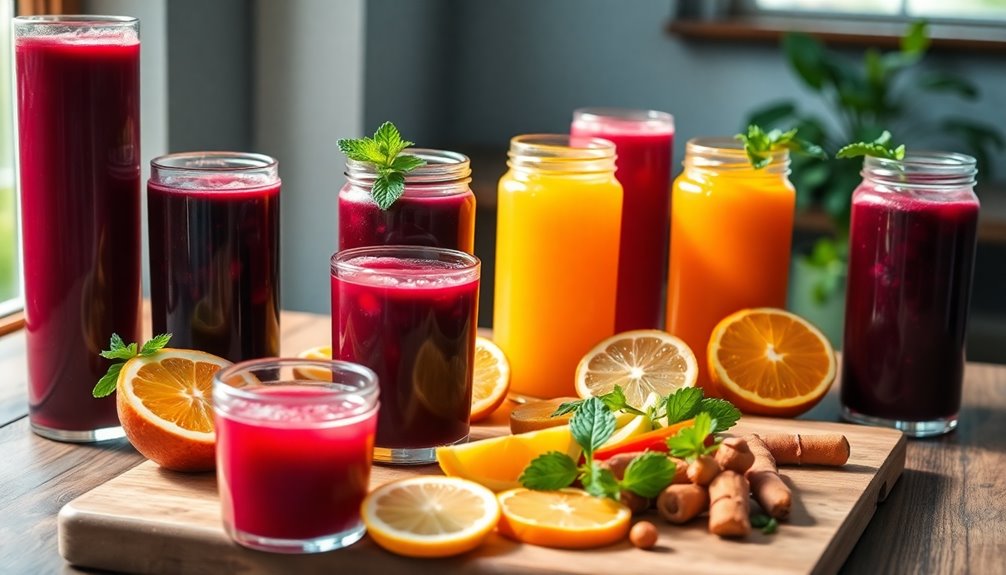
Making healthy juice at home can be a rewarding experience that boosts your nutrition and creativity. Start by choosing organic, fresh, and in-season produce to maximize flavor and nutrients while minimizing pesticide exposure.
Incorporate a variety of colorful fruits and vegetables to guarantee you're getting a diverse range of phytonutrients and antioxidants, which provide numerous health benefits.
Don’t forget to use peels and seeds when possible, as they add extra fiber that aids digestion. Balance your juice intake with whole fruits and veggies to enhance your fiber content and help you feel full. Additionally, incorporating a variety of fruits and vegetables can ensure you’re getting a broad spectrum of nutrients that contribute to overall health. For those recovering from dental procedures like wisdom teeth and pineapple juice can be a refreshing option, but it’s important to consider the acidity, which may irritate sensitive gums. Always listen to your body and adjust your choices accordingly to maintain optimal digestive health.
Experiment with healthy juice recipes, adding ingredients like ginger for anti-inflammatory properties or citrus for a vitamin C boost to create delicious blends that supercharge your health!
Choosing the Right Juice for Your Needs
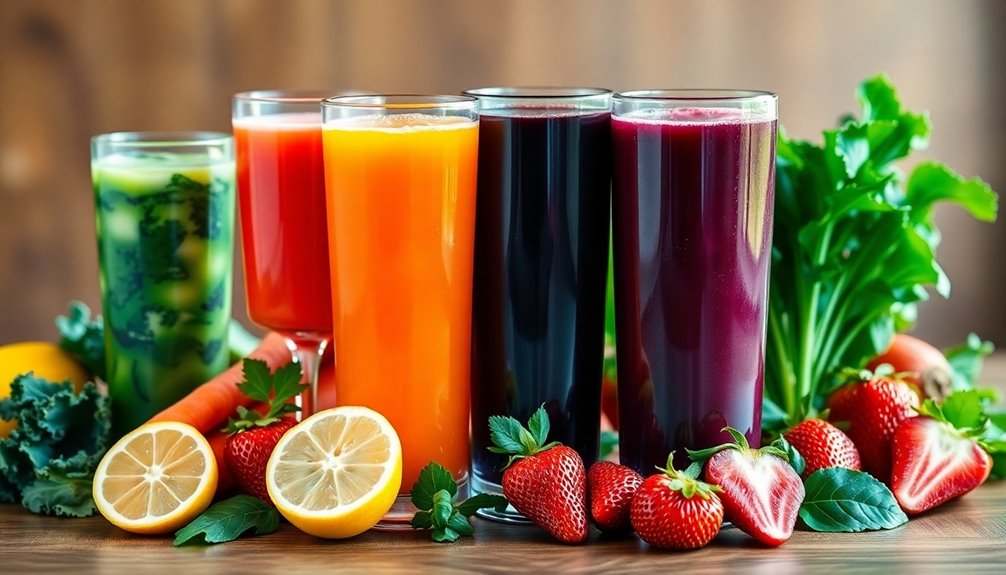
When you consider your health goals, choosing the right juice becomes an essential part of your nutrition strategy.
If you're aiming for immune support, go for juices high in vitamin C, like orange or lemon juice.
To boost energy and enhance athletic performance, beetroot juice is a great option as it helps improve blood flow.
For those looking to improve digestion, apple and carrot juices offer fiber and antioxidants that promote gut health.
If hydration is your focus, coconut water provides natural electrolytes, making it a revitalizing choice.
Finally, if you want to reduce sugar intake, opt for vegetable-based juices like celery or green juices, which are lower in carbohydrates and can help lower blood pressure while keeping your health on track. Additionally, incorporating green juices for cleansing can further enhance your detoxification efforts and support overall wellness.
Frequently Asked Questions
What Is the Best Juice for Overall Health?
When you're looking for the best juice for overall health, consider orange juice for its high vitamin C content, which boosts your immunity.
Green juice offers a low-calorie option packed with essential nutrients that can energize you and aid detoxification.
Beetroot juice may enhance your athletic performance and lower blood pressure, while pomegranate juice supports heart health.
Don't forget about apple juice, which provides potassium and antioxidants for digestive wellness.
Which Juice Is No 1?
When it comes to the number one juice, you can't go wrong with orange juice.
It's packed with vitamin C, boosting your immune system while providing essential antioxidants that may protect against diseases. One cup offers potassium, helping manage blood pressure and cholesterol levels.
You'll also benefit from its fiber content, which supports digestion. Plus, its anti-inflammatory properties can ease arthritis-related discomfort, making orange juice a top choice for overall health.
What Is the Best Juice to Drink for Your Heart?
When you're looking for the best juice for your heart, consider options rich in antioxidants and nutrients.
Tomato juice, for instance, is packed with lycopene, which can support heart health.
Beet juice enhances athletic performance and lowers blood pressure thanks to its nitrates.
Pomegranate juice reduces inflammation, while orange juice boosts vitamin C and potassium levels.
You can't go wrong with acai berry juice either, as it helps combat oxidative stress and lower cholesterol.
What Juice Should I Drink Every Morning?
If you're looking for a juice to drink every morning, consider orange juice.
It's packed with vitamin C, boosting your immune system and energy.
Alternatively, green juice can enhance your detox efforts while keeping calories low.
Beetroot and apple juice is another great option, offering essential vitamins and helping reduce blood pressure.
For a revitalizing kick, try carrot, pineapple, and ginger juice, or opt for celery juice for its gut-healing benefits.
Conclusion
Juicing can be a game-changer for your health! Did you know that incorporating just one serving of juice a day can boost your intake of vitamins and antioxidants, helping to reduce the risk of chronic diseases by up to 25%? By exploring different types of juice drinks, you're not only treating your taste buds but also supercharging your well-being. So go ahead, experiment with delicious recipes, and find the perfect juice to fuel your vibrant lifestyle!
Cindy thoroughly researches juicing trends, techniques, and recipes to provide readers with practical advice and inspiration. Her writing style is accessible, engaging, and designed to make complex concepts easy to understand. Cindy’s dedication to promoting the advantages of juicing shines through her work, empowering readers to make positive changes in their lives through the simple act of juicing.

